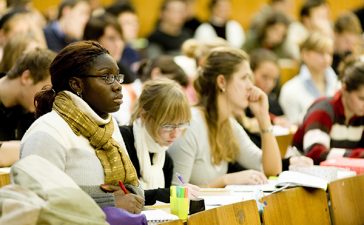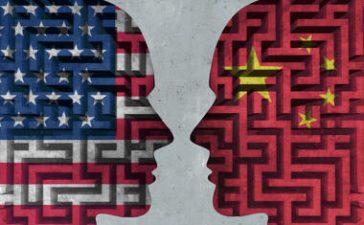The COVID-19 crisis and pre-existing China-United States tensions exacerbated during the pandemic will mean a rebalancing of cross-border academic relations, student and academic mobility, and in the pattern of research collaborations with China. But while the new landscape is not yet clearly mapped out, some trends are emerging, experts on China and international higher education have said.
The upcoming economic recession triggered by coronavirus shutdowns around the world, together with tighter budgets for institutions and research and in some countries the loss of fee-paying students, “may challenge Europe’s competitive edge over China in an unbalanced relationship,” said Marijk van der Wende, professor of higher education at Utrecht University, the Netherlands, during an online panel discussion on 14 May.
“Before the pandemic it was clear global flows had been shifting eastwards, and China was gaining influence as a global scientific power especially in the so-called STEM fields [science, technology, engineering and mathematics],” she said. “These trends are being enhanced due to the [coronavirus] crisis.”
“International mobility of Chinese students to Western countries is in decline and the return of Chinese scholars to China is expected to rise further,” she added during the online panel discussion jointly organised by Utrecht University and Germany’s University of Göttingen on “The New Silk Road in Time of Global Pandemic: Changing views on academic cooperation between China and the West”.
Academics predict an intensified China pivot towards Europe in research and higher education collaborations, but at a time when European higher education and science are reeling from the after-effects of the pandemic, and also within a more politicised environment which European and other universities will have to navigate carefully.
“The framing of Europe-China collaboration in higher education is being politicised, the conditions for collaboration are changing,” Van der Wende said. “We will have to work against a climate of political control and mistrust.”
This is being fuelled in part by tensions between the United States and China, including over the origins of the pandemic, and pressure from the US administration on Europe over European relations with China in all areas including trade, investment, higher education and research. “With coronavirus the US-China relationship has become even more tense,” Van der Wende said.
“The scientific response in search of a coronavirus vaccine at first seemed to introduce an unprecedented effort of global open science. But it may well become overshadowed by competition, protectionism and a blame game about the origin of the virus,” she added.
Simon Marginson, director of the Centre for Global Higher Education at the University of Oxford in the United Kingdom, pointed to recent scrutiny of US-based researchers working with China. “We have a situation where previously collaborative researchers who were encouraged to work together are now seen to be security risks,” he noted. And added: “There are pressures recently within Europe and the UK also to treat these academic and research and science links with China with more caution than before.”
Growing restrictions on social sciences and humanities research in China have also meant that European universities have “problems in China of establishing the same kind of academic freedoms and free-flowing cooperation that science and technology have been able to achieve on a world scale”, Marginson said.
“We are past the age when opening up to China was seen by many academic decision-makers and also a large number of faculty as a major opportunity of value, but also there has been a rising climate of distrust, of anxiety of being on the losing end of the idea that intensifying academic relations with China will be ultimately highly disadvantageous for one’s own university in one’s own country,” said Dominic Sachsenmaier, professor of Chinese studies at Germany’s University of Göttingen.
“If establishing or intensifying collaboration with Chinese universities, we will have to actively work against this climate.”
Nian Cai Liu, director of the Centre for World-Class Universities and dean of the Graduate School of Education at Shanghai Jiao Tong University, China, agreed that a post-pandemic rebalancing of higher education cooperation between China and the West was likely.
“This has already been happening in the last couple of years without the coronavirus crisis because of US policy,” he said. But he noted that “the rebalancing should be a good thing for the world”.
Liu said: “Now it is a very difficult time for internationalisation and globalisation in general, and for the last few years actually, because of the US and its ‘America First’ policy.” He said this had been complicated recently by the coronavirus, “but personally I think the impact of coronavirus pandemic will be temporary,” he added.
Uneven global recovery
Marginson pointed to a possible uneven pattern of post-pandemic recovery which could affect the ‘rebalancing’ of academic and research ties.
“The signs are that in China the universities and science and humanities will recover more quickly than they will recover in the United States and the United Kingdom,” he said, noting that Chinese universities are already putting out feelers for new collaborations as the coronavirus recedes in China while it is still rampant in much of Europe. “Chinese colleagues are already ready to go,” he said.
“Chinese students coming into English-speaking countries in Western Europe will be slow to recover. And Chinese international education will recover faster and be active, particularly in East Asia,” predicted Marginson.
“Recession forecasts indicate that China will suffer less from the consequent recession than the West and may thus be able to further capitalise on these shifting flows and its continued investments in higher education and research,” Van der Wende said.
Patterns of unevenness between academic fields, notably between STEM and the social sciences and humanities could also emerge, with the likelihood that STEM may recover sooner in China, she added.
Sachsenmaier said social and political crises – including rising xenophobia – brought about by economic and fiscal crises during the pandemic will have a big impact on patterns of academic migration and also what countries will be seen as attractive destinations for students and scholars to go to after the pandemic.
China’s pivot to Europe and Southeast Asia
US-China tensions have intensified into a Cold War, and post-pandemic China would turn to Europe and other parts of Asia, said Gerard Postiglione, professor of higher education at the University of Hong Kong.
Anthony Welch, professor of higher education at the University of Sydney in Australia, said international collaboration had become “increasingly challenged”. The pandemic has “cataclysmically foreclosed on a lot of international travel and collaboration”.
China’s trade and infrastructure Silk Road initiative had made China more important to Southeast Asian countries, “who, of course, are also facing that ethical dilemma of trying to steer between China and the United States”, Welch said, while noting that China-Southeast Asia academic cooperation could become more important.
Van der Wende noted: “Chinese universities are more interested in European partnerships now as US-China relations are worsening.” European academics still defend continuing scientific cooperation with China “and underline the importance of science diplomacy especially in times of political tension”, she said.
The turn to Europe had already become evident in China’s increased collaborations with universities in Central and South Eastern Europe, she noted.
The number of Chinese students to those countries has been rising in the wake of new cooperation opportunities under the umbrella of the 17+1 platform, promoted by China’s foreign ministry and which shapes relations between China and the 17 countries in Central and Eastern Europe as part of China’s Belt and Road or New Silk Road initiative.
Van der Wende pointed to Hungary where the Central European University was banned by the government which then invited China’s Fudan University to establish a branch campus.
But she said it would lead to new questions within Europe about open, fair and transparent transfer of knowledge and secure exchange of data with China.
“Already before coronavirus, [European] member states were asking the EU to negotiate a better level playing field for scientific cooperation with China,” she said. “Now states are also asking the EU to protect knowledge, data security and research integrity against foreign interference.”
Politicisation of higher education
Academics questioned how open China would be to research collaborations after the pandemic. “With the sensitivities that now exist within our relations with China, building relations with China might look like a negative rather than a positive,” said Marginson, describing it as a “worrying” change.
William Kirby, professor of China studies at Harvard University in the US, underlined that “at every major Chinese university there is an increase in the crackdown on academic discourse whenever it can veer even remotely into the norm of politics”.
But Shanghai Jiao Tong University’s Liu said differences were small and would not hamper collaboration. “There are differences between these two different systems in education and research, but nevertheless universities in Europe, particularly research universities in Europe and in China have a lot more in common than the differences,” Liu maintained.
He said the main functioning and expertise of research universities in China and in the West “are very similar and they are converging”, adding that “the differences are really about the role of government and some ideological education issues in different parts of the world”.
Need for global collaboration
The panel members agreed that collaboration was important in the post-pandemic world, not least to tackle other global challenges such as poverty, climate change and other health issues. “Apart from how political and ideological winds blow, we can build on decades of successful academic cooperation between universities in China and the West,” Van der Wende said.
“This is an opportunity to reassess values and form alliances and bring scientists together and those in the humanities” to tackle the next global challenge, Postiglione said.
“The lessons of history show us that the best response to these kinds of challenges is international collaboration,” Liu said. “It’s of great value to have various kinds of structured dialogues, structured coordination, platforms or tools,” and pointed to China’s flagship Belt and Road Initiative “as an excellent platform to further collaborations between China and Europe”.
He said the New Silk Road initiative “also provides opportunities and financial and other support” to institutions.
Economic conditions will be tougher for every country after the pandemic, Welch said, “and that includes money for research and for universities. It underlines the importance of international collaboration because, increasingly, individual universities will not be able to sustain major research projects.”
“The last thing we need is again to be divided into two camps,” Welch said.







